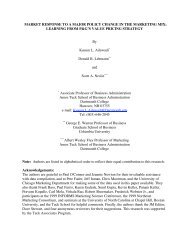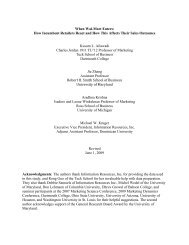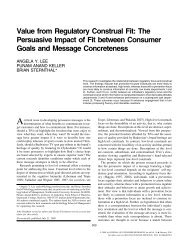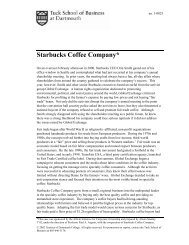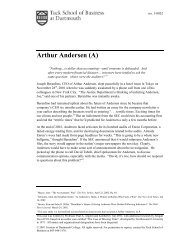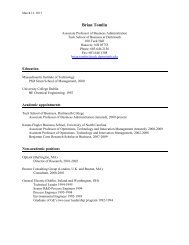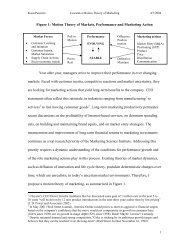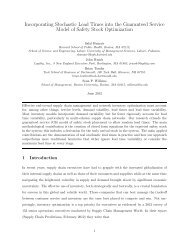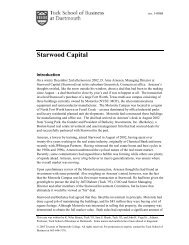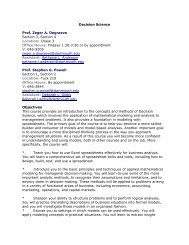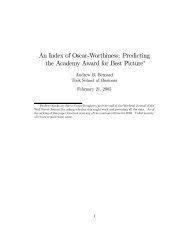tax notes international - Tuck School of Business - Dartmouth College
tax notes international - Tuck School of Business - Dartmouth College
tax notes international - Tuck School of Business - Dartmouth College
Create successful ePaper yourself
Turn your PDF publications into a flip-book with our unique Google optimized e-Paper software.
GERMANY<br />
confessed to his wrongdoing on January 22 at the start<br />
<strong>of</strong> his trial. (For prior coverage, see Doc 2009-1382 or<br />
2009 WTD 13-3.)<br />
Since news <strong>of</strong> the Liechtenstein scandal broke in<br />
February 2008, German prosecutors have reportedly<br />
recovered over €150 million from German <strong>tax</strong>payers<br />
seeking to avoid a trial. German authorities claim that<br />
up to €4 billion was hidden in Liechtenstein.<br />
Haiti<br />
♦ Randall Jackson, Tax Analysts.<br />
E-mail: rjackson@<strong>tax</strong>.org<br />
Mobile Phone Service Providers<br />
Oppose Tax Hike<br />
Mobile phone service providers in Haiti are protesting<br />
a 2008-2009 budget measure that would increase<br />
the <strong>tax</strong> on mobile phone users.<br />
Radio Kiskeya, a Port-au-Prince news radio station<br />
reported on January 16 that the new proposal would<br />
amend the <strong>tax</strong>ation component <strong>of</strong> the Telecommunications<br />
Act <strong>of</strong> 2002.<br />
Mobile service providers have joined together to oppose<br />
the <strong>tax</strong> increase, claiming it would hurt the<br />
economy. Digicel, Voila, and Haitel insist that raising<br />
the <strong>tax</strong> on cell phone use would actually reduce <strong>tax</strong><br />
revenue by discouraging cell phone use and in turn<br />
reducing general business activity.<br />
The three companies say they have invested more<br />
than $600 million in the nation’s networks and services<br />
over the past 10 years, and that they directly employ<br />
more than 2,000 Haitians. They claim that as many as<br />
55,000 jobs indirectly rely on the smooth functioning<br />
<strong>of</strong> the telecommunications sector.<br />
Haiti’s General Tax Directorate acknowledged that<br />
the telecom sector has been the greatest source <strong>of</strong> government<br />
<strong>tax</strong> income since 1999, producing 28 percent<br />
<strong>of</strong> Haitian revenues in fiscal 2007-2008, which ended<br />
September 30, 2008.<br />
The proposed changes reportedly include a new<br />
charge <strong>of</strong> HTG 3.60 per minute (about $0.09) for local<br />
calls and HTG 4 per minute for <strong>international</strong> calls. The<br />
new charges would come on top <strong>of</strong> the current charge<br />
<strong>of</strong> HTG 4.70 per minute that subscribers must pay; the<br />
current charge includes a 10 percent revenue <strong>tax</strong>.<br />
♦ Randall Jackson, Tax Analysts.<br />
E-mail: rjackson@<strong>tax</strong>.org<br />
Hungary<br />
Employer Tax Cut, VAT Increase<br />
Under Consideration<br />
The Hungarian government has proposed cutting<br />
the payroll <strong>tax</strong> employers must contribute to the nation’s<br />
social security system by 5 percentage points to<br />
augment employment as Hungarian businesses struggle<br />
with liquidity and credit issues arising from the world<br />
financial crisis.<br />
In announcing the proposed payroll <strong>tax</strong> cut, Prime<br />
Minister Ferenc Gyurcsany was careful to emphasize<br />
that overall government revenue cannot be allowed to<br />
plummet as a result <strong>of</strong> <strong>tax</strong> breaks, according to media<br />
reports. He therefore also proposed increasing the VAT<br />
rate by 2 to 3 percentage points — to 22 percent or 23<br />
percent — to <strong>of</strong>fset the revenue loss from the payroll<br />
<strong>tax</strong> reduction.<br />
The government estimates that the proposed payroll<br />
<strong>tax</strong> reduction would cost an estimated HUF 300 billion<br />
(about $1.4 billion).<br />
The <strong>tax</strong> proposals follow a January 25 meeting at<br />
which Gyurcsany told economists that a reduction in<br />
Hungary’s <strong>tax</strong> and contribution rates is necessary to<br />
maintain the nation’s competitiveness.<br />
The economists suggested that Budapest put in place<br />
an overall economic and social reform plan that would<br />
cover the next three to four years, extending beyond<br />
the next parliamentary elections in 2010.<br />
Hungarian industrialists <strong>of</strong>fered their own suggestion<br />
at the January 25 gathering. Peter Furo, head <strong>of</strong> the<br />
Confederation <strong>of</strong> Hungarian Employers and Industrialists,<br />
told the Hungarian press that his organization suggested<br />
that Budapest suspend the capital gains <strong>tax</strong> for a<br />
year or two to spur savings and the purchase <strong>of</strong> government<br />
securities.<br />
While Gyurcsany was receptive to the economists’<br />
suggestion, he remained noncommittal toward the<br />
CGT proposal.<br />
The government expects the economy to contract by<br />
2 percent to 3 percent in 2009, forcing an adjustment<br />
in the budget that was approved in December 2008.<br />
But while Gyurcsany pointed to the need to lessen the<br />
<strong>tax</strong> burden on businesses, he also spoke <strong>of</strong> the need to<br />
maintain the budget’s deficit target <strong>of</strong> less than 3 percent<br />
<strong>of</strong> GDP, as required by the European Union.<br />
The government therefore hopes it can redistribute<br />
the <strong>tax</strong> burden, freeing up corporate money while preserving<br />
the income needed to hold down borrowing<br />
and the potential <strong>of</strong> an inflated deficit.<br />
Unnamed government sources were quoted as saying<br />
that Budapest wants to rearrange about HUF 1 trillion<br />
<strong>of</strong> spending and revenue items in the 2009 budget,<br />
394 • FEBRUARY 2, 2009 TAX NOTES INTERNATIONAL<br />
(C) Tax Analysts 2009. All rights reserved. Tax Analysts does not claim copyright in any public domain or third party content.



